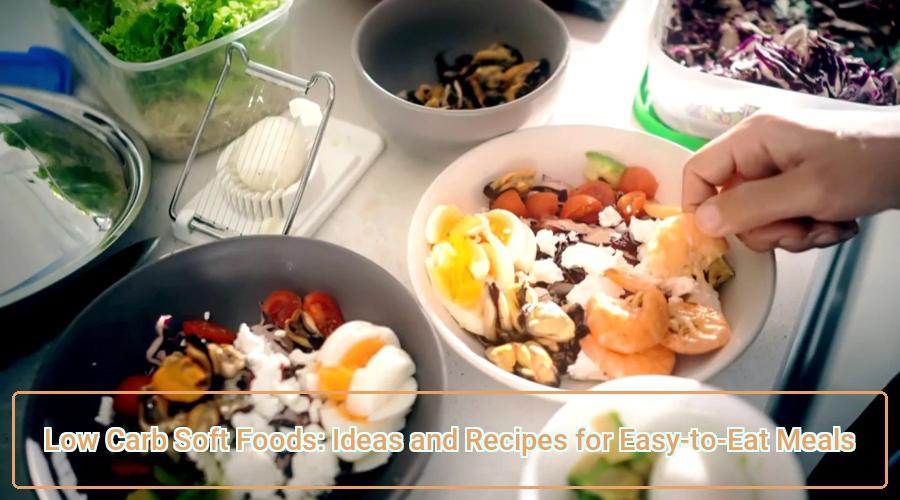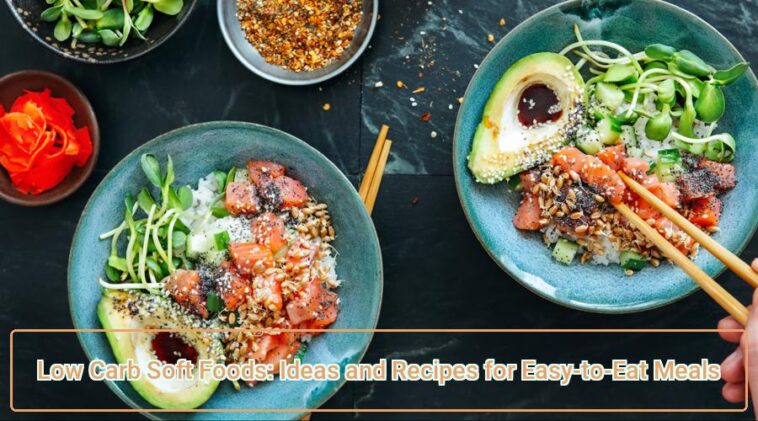If you’re on a low carb diet and have difficulty chewing or swallowing due to dental problems or surgery, you may need to follow a soft food diet. But finding delicious and nutritious low carb soft foods can be challenging. Fortunately, there are plenty of options to satisfy your taste buds and dietary needs.
In this article, we’ll explore the best low carb soft foods and offer some ideas and recipes for easy-to-eat meals. Whether you’re looking for a post-surgery recovery meal plan or simply want to add more soft foods to your diet, this guide will provide you with plenty of inspiration.

Benefits of a low carb soft foods diet
A low carb soft foods diet can offer several benefits, particularly for those who have difficulty chewing or swallowing hard or crunchy foods. This type of diet can be helpful for people with dental issues, jaw pain, or those recovering from oral or facial surgeries. The diet typically consists of foods that are easy to chew and swallow, such as soft fruits, cooked vegetables, and ground or pureed meats.
In addition to being helpful for those with dental or jaw issues, a low carb soft foods diet can also be beneficial for weight loss. This type of diet often eliminates or limits high-carbohydrate foods like bread, pasta, and rice, and instead focuses on high-protein, low-carb options like meat, fish, and non-starchy vegetables. This can lead to improved blood sugar control and insulin sensitivity, which can aid in weight loss and help manage type 2 diabetes.
A low carb soft foods diet may also provide benefits for heart health. Studies have shown that a low-carb diet can help lower levels of triglycerides, a type of fat in the blood that can increase the risk of heart disease. Additionally, this type of diet can lead to a reduction in blood pressure and an increase in “good” HDL cholesterol, both of which are important for heart health.
Soft food diet: What it is and who it’s for
A soft food diet is a type of eating plan that includes foods that are easy to chew and swallow, and are typically low in fiber and fat. This type of diet is recommended for people who have difficulty chewing or swallowing due to dental issues, surgery, or medical conditions. The soft food diet is also appropriate for people with digestive issues, such as gastritis, ulcers, or inflammatory bowel disease.
The goal of a soft food diet is to provide adequate nutrition while reducing the risk of discomfort or injury when swallowing. This type of diet may include foods such as cooked vegetables, mashed potatoes, soft fruits, soups, scrambled eggs, and ground meats. It is important to avoid hard, crunchy, or sticky foods that can cause choking, such as raw vegetables, nuts, popcorn, and chewy candies.
If you are on a soft food diet, it is important to make sure that you are getting all of the necessary nutrients to maintain your health. You may need to supplement your diet with vitamins or minerals if you are not able to consume a wide variety of foods. It is also important to talk to your healthcare provider about any dietary restrictions or modifications that may be necessary based on your medical condition or situation.

Essential nutrients in low carb soft foods
Protein: Protein is important for building and repairing tissues in the body. Some low carb soft foods that are high in protein include eggs, cottage cheese, Greek yogurt, and soft tofu. These foods can also help to keep you feeling full for longer periods of time.
Healthy Fats: Healthy fats are an essential nutrient for the body and can help to reduce inflammation and support brain function. Some examples of healthy fats in low carb soft foods include avocados, nuts, and seeds. You can incorporate these foods in a soft food diet by blending them into a smoothie or spreading nut butter on soft bread.
Fiber: Fiber is important for digestive health and can also help to regulate blood sugar levels. Low carb soft foods that are high in fiber include cooked vegetables, berries, chia seeds, and flax seeds. Pureed soups or smoothies can also be a great way to incorporate these foods into your diet.
Delicious low carb soft foods for breakfast
When following a low-carb and soft food diet, it can be challenging to find satisfying breakfast options that fit within the dietary restrictions. However, there are still plenty of delicious low carb soft food breakfast ideas available. Some great options include eggs in various forms, such as scrambled, poached, or boiled, as they are easy to chew and packed with protein.
Smoothies are another great low carb soft food breakfast option. With the right ingredients, smoothies can be both nutritious and delicious. Consider blending low-carb fruits such as berries, avocado, and coconut milk, along with some protein powder or yogurt, to make a satisfying and tasty breakfast.
For those who prefer a more traditional breakfast, oatmeal can be a great option. It is easy to chew and can be made with low-carb ingredients such as almond or coconut milk and nuts, seeds, and low-carb fruits like berries or apples. There are also numerous low-carb and gluten-free cereals available, such as almond and flaxseed cereal or keto-friendly granola, which can make for a convenient and quick breakfast option.

Low carb soft foods for lunch on the go
A busy day out and about doesn’t mean you have to compromise on your low carb soft foods diet. There are many delicious, healthy, and easy-to-pack options for lunch on the go that can be enjoyed by everyone, whether they’re on a special diet or not.
One great option for a low carb soft food lunch is a salad. You can prepare a salad at home and store it in a container or jar, making it easy to bring with you wherever you go. Include some healthy fats like avocado or nuts, as well as a protein source like chicken or tofu to keep you satisfied and energized.
Another excellent option is a low carb wrap, using a lettuce or collard green leaf as a substitute for bread. Fill it with your favorite protein and veggies, and you’ll have a portable, nutritious lunch that’s also delicious. You can also use low carb tortillas or pita bread for a more traditional wrap or sandwich, as long as they fit into your daily carb allowance.
Easy-to-make low carb soft food recipes for dinner
Following a low carb soft food diet doesn’t mean you have to compromise on taste. There are several easy-to-make low carb soft food recipes that are perfect for dinner. Some of these recipes include baked salmon, cauliflower mashed potatoes, and spinach soup. Baked salmon is a great source of protein and healthy omega-3 fatty acids. To make it soft, bake it in parchment paper with some herbs and lemon juice. Cauliflower mashed potatoes are a great alternative to regular mashed potatoes, and they are low in carbs. To make it soft, steam the cauliflower until it’s very tender, then blend it with some butter and cream. Finally, spinach soup is a tasty and nutritious low carb soft food that’s perfect for dinner. To make it, sauté some onion and garlic, then add spinach and chicken broth. Blend the soup until it’s smooth and serve it warm.
Another delicious low carb soft food recipe for dinner is baked chicken and vegetables. To make it, cut up some chicken breast and vegetables, then toss them in olive oil and seasonings. Place them on a baking sheet and bake in the oven until they’re tender and juicy. You can also try making a low carb version of shepherd’s pie by using mashed cauliflower instead of mashed potatoes. This recipe is not only soft and comforting but also nutritious and satisfying.
If you’re looking for a vegetarian option, you can try making zucchini noodles with pesto. To make it soft, sauté the zucchini noodles until they’re tender, then toss them with some homemade or store-bought pesto sauce. Another low carb soft food recipe for dinner is stuffed peppers. To make it, stuff bell peppers with ground beef, cauliflower rice, and tomato sauce. Bake the stuffed peppers until they’re tender and juicy, and enjoy a delicious and nutritious dinner.

Low carb soft foods for snacking and grazing
First on the list are smoothies made with low-carb fruits and veggies like spinach, kale, cucumber, berries, and avocado. You can also add some healthy fats like coconut oil, chia seeds, or nut butter for added creaminess and satiety. Smoothies are a great way to get in some extra nutrients while also keeping you full and energized throughout the day.
Another great low carb soft food snack is hummus, which can be made with low-carb legumes like chickpeas, or even with vegetables like zucchini or eggplant. Pair it with some sliced veggies like bell peppers, carrots, or cucumbers for a filling and refreshing snack that’s perfect for dipping.
Lastly, you can also make your own low carb soft food snacks like energy balls or protein bars, which are perfect for satisfying your sweet tooth without derailing your low-carb diet. You can make them with ingredients like nuts, seeds, and natural sweeteners like dates or honey, and customize them with your favorite flavors and add-ins. They’re perfect for on-the-go snacking or when you need a quick burst of energy.
How to meal prep for a low carb soft food diet?
Here are some tips to help you prepare your meals for the week ahead:
- Choose soft, low carb foods: Make a list of soft foods that are also low in carbs. Some examples include cooked and mashed sweet potatoes, scrambled eggs, tofu, ground beef or turkey, cooked vegetables, and blended soups.
- Plan your meals: Plan out your meals for the week ahead and make a grocery list of the ingredients you’ll need. This will save you time and ensure that you have everything you need to prepare your meals.
- Batch cook: Cook large batches of soft foods such as soups, stews, and casseroles, then portion them out into individual servings. This will save you time and ensure that you always have a healthy, low carb meal on hand.
- Invest in good quality storage containers: To keep your meals fresh for longer, invest in high-quality storage containers that are microwave-safe and can be easily transported.

Tips for transitioning to a low carb soft food diet
Start slow: It’s important to ease into a new diet, especially one that limits certain foods. Start by eliminating one high-carb food group at a time, such as bread, rice, or pasta. Replace these foods with low-carb alternatives like cauliflower rice or zucchini noodles. Gradually reduce your carb intake until you reach your desired limit.
Plan your meals: Meal planning is essential for any diet, but it’s especially important for a low carb soft food diet. Make a list of soft, low-carb foods that you enjoy, and plan your meals around them. Consider making soups, stews, and casseroles in advance, as they are easy to reheat and eat.
Experiment with new recipes: Eating the same foods every day can get boring quickly. Look for new recipes that use soft, low-carb foods like avocados, eggs, and cheese. Experiment with different flavors and seasonings to keep things interesting. Don’t be afraid to try new things, and you might be surprised by what you discover.
What are some low carb soft foods that can be easily incorporated into a meal plan?
There are several options for low carb soft foods, including cooked or pureed vegetables like carrots, sweet potatoes, and cauliflower, soft boiled eggs, Greek yogurt, cottage cheese, avocado, nut butters, and soft tofu.
Can a low carb soft food diet be nutritionally balanced?
Yes, a low carb soft food diet can be nutritionally balanced if you incorporate a variety of protein, healthy fats, and low carb vegetables. It’s important to ensure you’re meeting your daily recommended intake of essential nutrients, such as vitamins and minerals, by including a wide range of foods in your meal plan.
What are some tips for managing food textures on a low carb soft food diet?
To manage food textures on a low carb soft food diet, you can try cooking vegetables until they’re tender, pureeing them into a smooth consistency, or incorporating them into soups or stews. Adding healthy fats like olive oil, avocado, or nut butters can also help make foods easier to chew and swallow. Additionally, incorporating a variety of soft protein sources like tofu, fish, and ground meats can help make meals more satisfying and nutritionally balanced.



